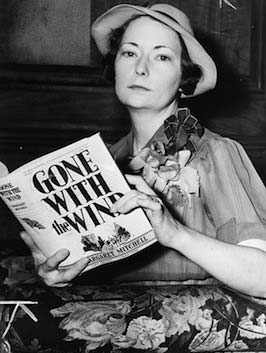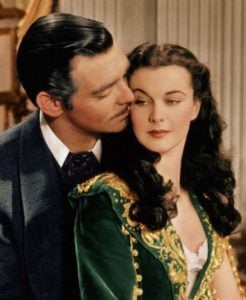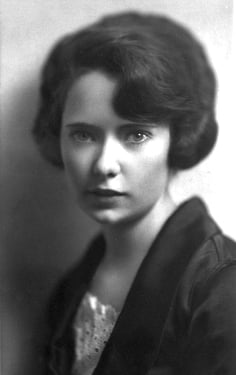Quotes from Gone With the Wind & More by Margaret Mitchell
By Nava Atlas | On November 11, 2017 | Updated January 1, 2023 | Comments (0)

No one more surprised than Margaret Mitchell (1900 – 1949) herself when Gone With The Wind became an immediate smash hit upon its June, 1936 publication. The novel went on to be published in over forty countries and was adapted as the faithful 1939 film.
Here we’ll explore quotes from Gone With the Wind as well as other gems from the pen of Margaret Mitchell. Margaret may have herself been partially the model for Scarlett O’Hara, one of the most complex and charismatic of literary heroines.
For nine agonizing years, Margaret worked and reworked the massive story, sometimes typing, sometimes scribbling by hand. The manuscript piled up here and there, on desks, in drawers, on closet shelves. She showed friends bits and pieces, but never the entire work. Perhaps no one was as amazed by its phenomenal success as its author.
Margaret Mitchell grew up in Atlanta, and was so steeped in the mythology of the South that she didn’t realize that the Confederacy lost the Civil War until she was 10 years old, or so she claimed. She grew up hearing stories about the war, the burning of Atlanta, and Reconstruction. A story began to take shape, though writing it was agonizing to the fledgling writer.
Mitchell worked as a reporter, and admitted that she had trouble framing opening sentences. She found the same challenge in starting the book, and so, as legend has it, she started with the last chapter and worked backward.
She labored on the manuscript for nine agonizing, frustrating years, working and reworking the massive story. It piled up on desks, in drawers, on closet shelves.
Finally, she handed more than 1,000 pages to a literary scout, not feeling very positive about its prospects. “I do hope they sell five thousand copies,” she remarked, “so they don’t lose money.” In one day GWTW sold 50,000 copies.
Reviews were generally positive, though some critics were decidedly mixed, as in this 1936 review in the New York Times. Though the book came out when African-Americans were still suffering under Jim Crow laws, the reviewer spared no punches for how Mitchell romanticized slavery.
. . . . . . . . . .

Learn more about Margaret Mitchell
. . . . . . . . . .
Quotes from Gone With the Wind (1936)
“You must be more gentle, dear, more sedate,’ Ellen told her daughter. ‘You must not interrupt gentlemen when they are speaking, even if you do think you know more about matters than they do. Gentlemen do not like forward girls.”
. . . . . . . . . .
“How wonderful it would be never to marry but to go on being lovely in pale green dresses and forever being courted by handsome men.” (Scarlett O’Hara)
. . . . . . . . . .
“Fiddle-dee-dee! Ashley Wilkes told me he likes to see a girl with a healthy appetite!” (Scarlett O’Hara)
. . . . . . . . . .
“Life was not easy, nor was it happy, but she did not expect life to be easy, and, if it was not happy, that was woman’s lot. It was a man’s world, and she accepted it as such. The man owned the property, and the woman managed it. The man took credit for the management, and the woman praised his cleverness.
The man roared like a bull when a splinter was in his finger, and the woman muffled the moans of childbirth, lest she disturb him. Men were rough of speech and often drunk. Women ignored the lapses of speech and put the drunkards to bed without bitter words. Men were rude and outspoken, women were always kind, gracious and forgiving.”
. . . . . . . . . .
“… all the bullying instincts in her nature rose to the surface. It was not that she was basically unkind. It was because she was so frightened and unsure of herself she was harsh lest others learn her inadequacies: and refuse her authority.”
. . . . . . . . . .
“She could not ignore life. She had to live it and it was too brutal, too hostile, for her even to try to gloss over its harshness with a smile.”
. . . . . . . . . .
“She couldn’t survey the wreck of the world with an air of casual unconcern.”
. . . . . . . . . .
“No, my dear, I’m not in love with you, no more than you are with me, and if I were, you would be the last person I’d ever tell. God help the man who ever really loves you. You’d break his heart, my darling, cruel, destructive little cat who is so careless and confident she doesn’t even trouble to sheathe her claws.”
. . . . . . . . . .
“Her burdens were her own and burdens are for shoulders strong enough to carry them.”
. . . . . . . . . .
“It isn’t that I mind splitting logs here in the mud, but I do mind what it stands for. I do mind, very much, the loss of the beauty of the old life I loved. Scarlett, before the war, life was beautiful. There was a glamor to it, a perfection and a completeness and a symmetry to it like Grecian art. Maybe it wasn’t so to everyone. I know that now. But to me, living at Twelve Oaks, there was a real beauty to living.
I belonged in that life. I was a part of it. And now it is gone and I am out of place in this new life, and I am afraid. Now, I know that in the old days it was a shadow show I watched. I avoided everything which was not shadowy, people and situations which were too real, too vital. I resented their intrusion. I tried to avoid you too, Scarlett. You were too full of living and too real and I was cowardly enough to prefer shadows and dreams.” (Ashley Wilkes)
. . . . . . . . . .
“Land is the only thing in the world that amounts to anything, for ’tis the only thing in this world that lasts, ’tis the only thing worth working for, worth fighting for — worth dying for.” (Scarlett’s father, Gerald O’Hara)
. . . . . . . . . .
You might also enjoy: The Search for Scarlett O’Hara
. . . . . . . . . .
“Now you are beginning to think for yourself instead of letting others think for you. That’s the beginning of wisdom.” (Rhett Butler)
. . . . . . . . . .
“As God is my witness, I’ll never be hungry again.” (Scarlett O’Hara)
. . . . . . . . . .
“The trouble with most of us Southerners … is that we either don’t travel enough or we don’t profit enough by our travels…. I have seen many things that you all have not seen. The thousands of immigrants who’d be glad to fight for the Yankees for food and a few dollars, the factories, the foundries, the shipyards, the iron and coal mines — all the things we haven’t got. Why, all we have is cotton and slaves and arrogance. They’d lick us in a month.” (Rhett Butler)
. . . . . . . . . .
“Your children will probably be soft, prissy creatures, as the children of hard-bitten characters usually are. And to make them worse, you, like every other mother, are probably determined that they shall never know the hardships you’ve known. And that’s all wrong. Hardships make or break people.” (Rhett Butler)
. . . . . . . . . .
“I love you, Scarlett, because we are so much alike, renegades, both of us, dear, and selfish rascals. Neither of us cares a rap if the whole world goes to pot, so long as we are safe and comfortable.” (Rhett Butler)
. . . . . . . . . .
Gone With the Wind (1939 film)
. . . . . . . . . .
“What most people don’t seem to realize is that there is just as much money to be made out of the wreckage of a civilization as from the upbuilding of one.” (Rhett Butler)
. . . . . . . . . .
“Dear Scarlett! You aren’t helpless. Anyone as selfish and determined as you are is never helpless. God help the Yankees if they should get you.” (Rhett Butler)
. . . . . . . . . .
“Out of the dullness, one thought arose. Ashley did not love her and had never really loved her and the knowledge did not hurt. It should hurt. She should be desolate, broken hearted, ready to scream at fate. She had relied upon his love for so long. It had upheld her through so many dark places. Yet, there the truth was. He did not love her and she did not care. She did not care because she did not love him. She did not love him and so nothing he could do or say could hurt her.”
. . . . . . . . . .
“War and marriage and childbirth had passed over her without touching any deep chord within her and she was unchanged.”
. . . . . . . . . .
“I’m tired of saying, ‘How wonderful you are!’ to fool men who haven’t got one-half the sense I’ve got, and I’m tired of pretending I don’t know anything, so men can tell me things and feel important while they’re doing it.” (Scarlett O’Hara)
. . . . . . . . . .
“Life’s under no obligation to give us what we expect. We take what we get and are thankful it’s no worse than it is.” (Ashley Wilkes)
. . . . . . . . . .
“You’re so brutal to those who love you, Scarlett. You take their love and hold it over their heads like a whip.” (Rhett Butler)
. . . . . . . . . .
“Death, taxes and childbirth! There’s never any convenient time for any of them.” (Scarlett O’Hara)
“Melly is the only woman friend I ever had,” she thought forlornly, “the only woman except Mother who really loved me. She’s like Mother, too. Everyone who knew her has clung to her skirts.” (Scarlett O’Hara)
. . . . . . . . . .
“He never really existed at all, except in my imagination,” she thought wearily. “I loved something I made up, something that’s just as dead as Melly is. I made a pretty suit of clothes and fell in love with it. And when Ashley came riding along, so handsome, so different, I put that suit on him and made him wear it whether it fitted him or not. And I wouldn’t see what he really was. I kept on loving the pretty clothes — and not him at all.” (Scarlett O’Hara, referring to Ashley)
. . . . . . . . . .
“These women, so swift to kindness, so tender to the sorrowing, so untiring in times of stress, could be as implacable as furies to any renegade who broke one small law of their unwritten code. This code was simple. Reverence for the Confederacy, honor to the veterans, loyalty to old forms, pride in poverty, open hands to friends and undying hatred of Yankees.”
. . . . . . . . . .
“Frankly, my dear, I don’t give a damn.” (Rhett Butler)
. . . . . . . . . .
“I’ll think of it tomorrow, at Tara. I can stand it then. Tomorrow, I’ll think of some way to get him back. After all, tomorrow is another day.” (Scarlett O’Hara)
. . . . . . . . . .
. . . . . . . . . .
Other quotes by Margaret Mitchell
“I had believed that established writers, writers who really knew how to write, had no difficulty at all in writing. I had thought that only luckless beginners like myself had to rewrite endlessly, tear up and throw away whole chapters, start afresh, rewrite and throw away again. I knew nothing about other writers and their working habits, and I thought I was the only writer in the world who went through such goings-on.”
. . . . . . . . . .
“In a weak moment, I have written a book.”
. . . . . . . . . .
“Never pass up new experiences, They enrich the mind.”
. . . . . . . . . .
“With enough courage, you can do without a reputation.”
. . . . . . . . . .
“Until you’ve lost your reputation, you never realize what a burden it was.”
. . . . . . . . . .
“I do not write with ease, nor am I ever pleased with anything I write. And so I rewrite.”
. . . . . . . . . .
“I was never one to patiently pick up broken fragments and glue them together again and tell myself that the mended whole was as good as new. What is broken is broken — and I’d rather remember it as it was at its best than mend it and see the broken places as long as I lived.”



Leave a Reply